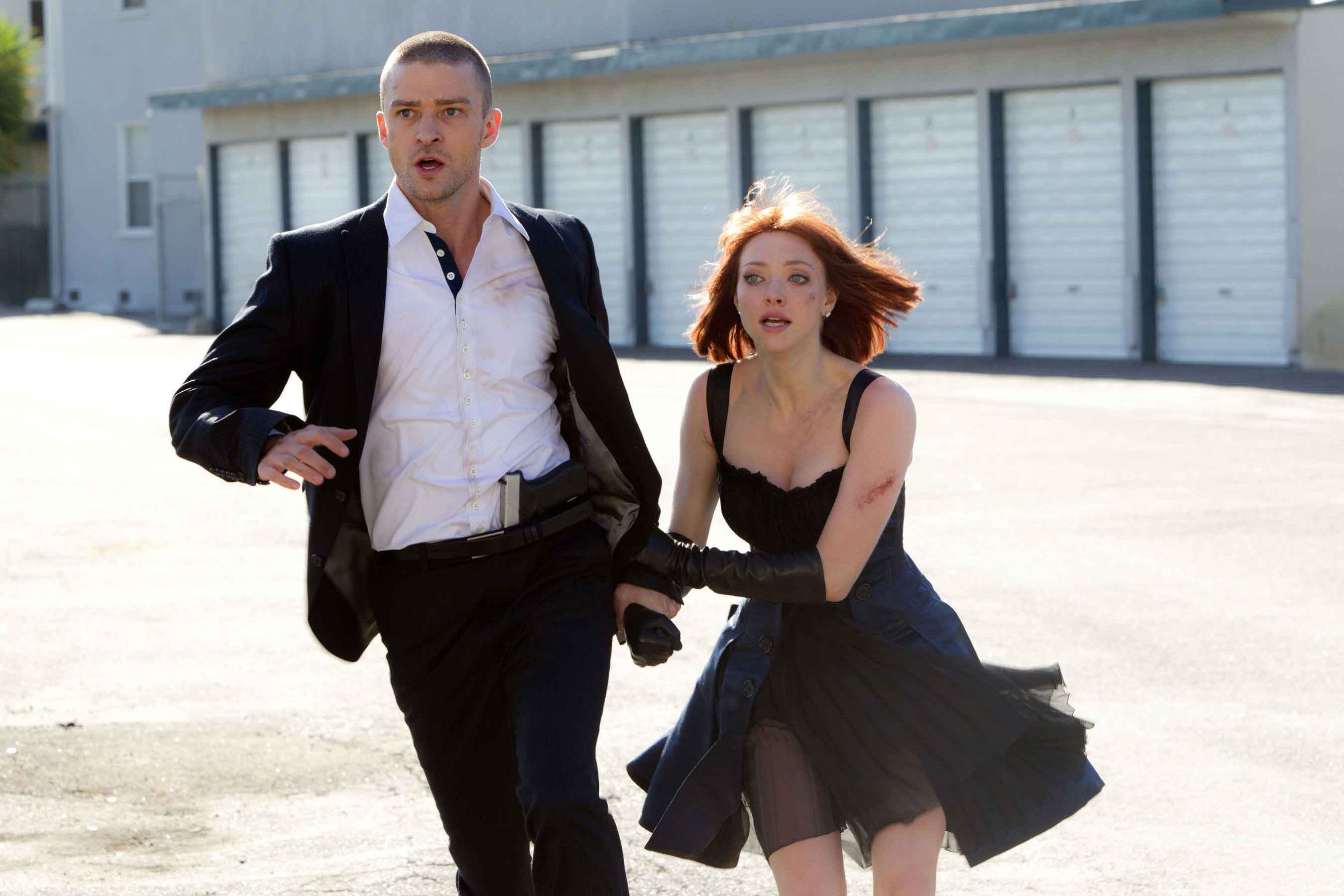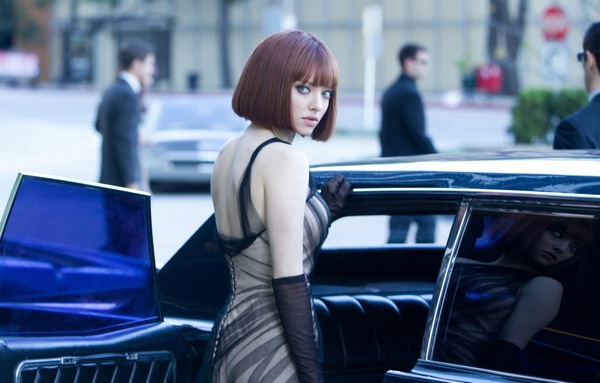|
In Time
Reviewed
by
Damien Straker on
October 27th, 2011
Twentieth Century Fox presents
a film directed by
Andrew
Niccol
Screenplay
by
Andrew
Niccol
Starring:
Justin Timberlake, Amanda Seyfried, Cillian Murphy and Olivia Wilde
Running
Time:
109 mins
Rating:
M
Released: October 27th,
2011
|
3/10
|
|
In
the
future people suddenly stop ageing at twenty-five years old. They can
live
longer by working for more hours, adding to their dwindling lifespan
engraved
on their arms. Time is also a currency where one can spend individual
minutes
or hours on commodities and share time with others to survive. Will
Salas
(Justin Timberlake) and his mother Rachel (Olivia Wilde) are a part of
this
dystopia. One night at a bar, Will attempts to save a man who is being
pursued
by gangsters because he has a century’s worth of time on his arm. They
escape
and the man reveals that society is deliberately increasing the cost of
living
in the ghettos so that people will die out. After the man shares his
time and
then kills himself, Will is investigated by a ‘timekeeper’ (Cillian
Murphy),
who is essentially a detective. Angry at another significant death,
Will enters
the wealthy district for revenge. At a casino he meets Sylvia (Amanda
Seyfried), the daughter of a wealthy businessman and they connect. When
the
timekeeper turns up, Will kidnaps Sylvia. She comes to admire his
recklessness and
together they begin to literally steal time from the rich.

In
Time
has about as much subtly
as a grandfather clock striking midnight. There will be heavy
speculation about
how such a fascinating concept, drawing richly from the themes of
Aldous
Huxley’s dystopian fiction, became such a misfire. The film is written
and
directed by Andrew Niccol, who previously made the science fiction film
Gattaca (1997) and penned the screenplay
for The Truman Show (1998). Those
were terrific films, examining
surveillance in such intelligent and visually inventive ways. By
writing and
directing this himself, his first feature since Lord of War
(2005), Niccol has not been able to take a step back
from his own material. His script is at fault here because it reads
like a bad
first draft. In a sea of mindless action films and reboots, he deserves
credit
for attempting to touch on ideas of class and economics. Yet it never
overcomes
the starting block of being more than just a potentially good idea. All
of the
characters are sketchily drawn and reveal too thinly the transparency
and
mechanics of the screenplay. As the characters stand around to debate
how unjust
society has become, we realise that they are ciphers for Niccol’s
thematic
concerns. This would matter less if the lines were well written but the
dialogue is grating and repetitive, thanks to clunkers like: “No one
should
live like this. You’ve never lived a day in your life father!” As shown
in the
superior dystopian film Children of Men (2006),
a distinguishable setting and selective camerawork is invaluable to
expressing
a way of life. But Niccol’s has forgotten the golden rule of
screenwriting: ‘show,
don’t tell’. He lacks aid and imagination from the film’s cheap visual
design.
The city, mimicking the likes of an impoverished Detroit, is never
affecting
and given this is meant to be a world where time can be transferred in
a
handshake you’d expect its architecture to be more elaborately enhanced.

Potential
for social commentary and satire is also weakened by Niccol’s bid to
show his
hand too soon. There are no shades of grey here. The rich are wealthy
but bored
and the poor are cheated by the state so that it increases the cost of
living.
Sound familiar? The director compounds the simplicity of this issue by
having characters
verbally reference the likes of Charles Darwin and the ‘survival of the
fittest’.
There is rarely a moment where the themes are allowed to boil under the
surface, letting the audience think for themselves. Viewed as a
straight
thriller, In Time is an untidy piece.
The narrative is episodic, made up of obligatory car chases and
superfluous
characters. The script needed tightening because there are scenes, such
as the
one in a casino, that are overextended and logically amiss. The
strangest
inclusion is probably its best and that’s when the film alludes to Bonnie and Clyde (loosely) and John
Dillinger, as Will and Sylvia start robbing places, giving out time
quotients to
the poor. If it had focused on a series of heists and had less of the
gangsters
and Sylvia’s father, it would have been more cohesive. The performances
are mostly
uninspired. Timberlake, brilliant in The
Social Network (2010), has proven
that he can act. The kid is a born performer but he’s been reined in
and told
to scowl more, which means the film makes less use of his charisma or
cheek.
Murphy looks like he’s just walked off the set of The
Matrix (1999) and Seyfried brings little edge to her character.
When she says that her father thinks she’s reckless it’s laughable.
Olivia
Wilde has the most thankless part because with just two or three scenes
she’s
reduced to little but a cameo. Given that there was an embargo
preventing any
reviews of In Time to be published
before its starting date, it’s presumable that the studios saw what was
coming.
Once this silly film is released officially in America there will be a
new
reason to hate socialism.
|